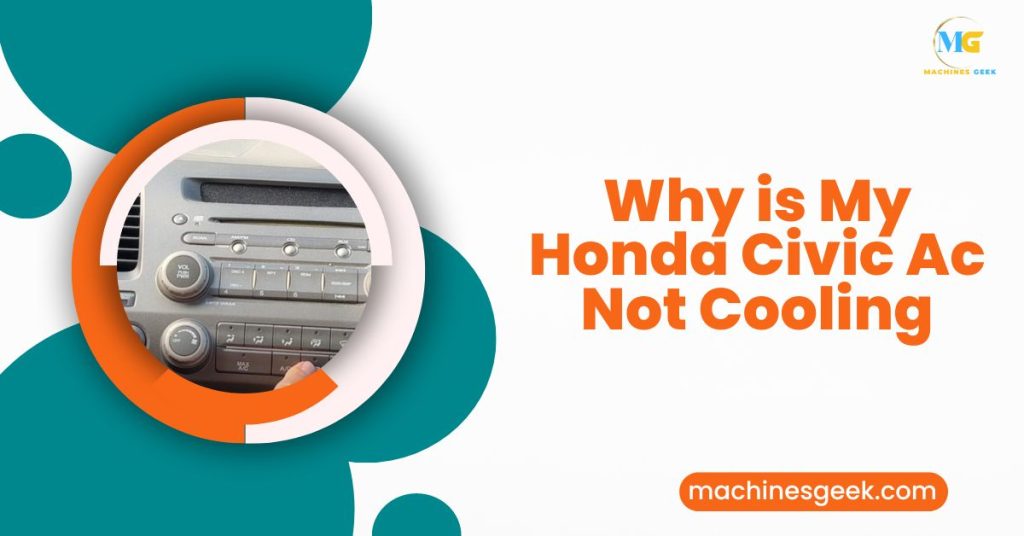Why is My Honda Civic Ac Not Cooling? Your Honda Civic AC may not be cooling due to low refrigerant levels or a faulty compressor. Is your Honda Civic AC not cooling?
Are you frustrated with the lack of cold air on those hot summer days? There could be a couple of reasons why your AC isn’t working as it should. Two common culprits are low refrigerant levels or a faulty compressor.
Low refrigerant levels can prevent your AC from cooling effectively, while a faulty compressor may not be able to circulate the refrigerant properly. Fortunately, these issues can be diagnosed and resolved by a qualified technician. We will delve deeper into these potential causes and explore other possible reasons for your Honda Civic AC not cooling. By understanding the root of the problem, you can take the necessary steps to restore your AC’s cooling capabilities.
Common Issues With Honda Civic Ac
Is your Honda Civic AC not cooling? There are a few common issues that could be causing this problem.
If your Honda Civic AC is not cooling properly, it could be due to low refrigerant levels in the system. Refrigerant is responsible for absorbing heat from the air and cooling it down. When the refrigerant levels are low, the AC system does not have enough coolant to perform this process effectively. To fix this issue, you will need to have the refrigerant levels checked and topped up by a professional technician.
A faulty compressor can also cause your Honda Civic AC to stop cooling. The compressor is responsible for pressurizing and circulating refrigerant throughout the AC system. If the compressor is not functioning properly, it will not be able to perform this task efficiently, resulting in a lack of cooling. In this case, you will need to have the compressor inspected and replaced if necessary.
Clogged air filters can restrict the airflow in your Honda Civic AC system, leading to reduced cooling performance. Air filters are responsible for removing dust, pollen, and other particles from the air before it enters the AC system. Over time, these filters can become clogged with debris, restricting the airflow. To resolve this issue, you should regularly clean or replace the air filters in your Honda Civic AC system.
how To Troubleshoot Honda Civic Ac Cooling Problems?
Are you experiencing issues with the cooling of your Honda Civic AC? Don’t worry, we’re here to help you troubleshoot and identify the problem. Follow these steps to get to the root cause of your AC cooling problems:
Inspecting Refrigerant Levels Using Gauges: Use gauges to check the refrigerant levels in your AC system. Ensure they are within the recommended range.
Recharging the AC System: If the refrigerant levels are low, recharge the AC system and ensure it is at the appropriate level.
Listening for Unusual Noises: Start the car and listen for any unusual noises coming from the compressor. This could indicate a problem.
Inspecting for Physical Damages: Visually inspect the compressor for any physical damages or leaks.
Checking Electrical Connections: Ensure all electrical connections related to the compressor are secure and in good condition.
Removing and Cleaning the Air Filters: Take out the air filters and clean them thoroughly to improve airflow.
Checking for Blockages in the Ducts: Inspect the ducts for any blockages that may hinder airflow.
Checking for Proper Functioning: Make sure the condenser fan is functioning properly and providing sufficient air circulation.
Cleaning or Replacing the Fan if Needed: If the condenser fan is dirty or damaged, clean or replace it accordingly.
when To Seek Professional Help?
When it comes to your Honda Civic AC not cooling, it can be frustrating and uncomfortable. However, it is essential to know when to seek professional help to diagnose and fix the issue. Warning signs of complex AC issues include leaking refrigerant, irregular cooling patterns, unusual vibrations, or odors.
If you notice any of these signs, it is crucial to engage the services of a professional AC technician. They have the expertise and tools to identify the root cause of the problem and provide appropriate solutions. Additionally, professional AC maintenance plays a critical role in keeping your system in optimal condition.
Regular maintenance can prevent potential issues and extend the lifespan of your AC unit. Remember, when it comes to AC problems, it’s best to trust the professionals to ensure a cool and comfortable ride.
Frequently Asked Questions
Why Is My Honda Civic AC not Blowing Cold Air?
Your Honda Civic AC may not be blowing cold air due to a refrigerant leak, a faulty compressor, or a clogged condenser.
How Do I Troubleshoot My Honda Civic Ac?
To troubleshoot your Honda Civic AC, check for blown fuses, ensure the compressor is running, inspect for refrigerant leaks, and clean or replace the cabin air filter.
What Are The Signs Of A Failing Honda Civic AC Compressor?
Signs of a failing Honda Civic AC compressor include lack of cool air, strange noises when the AC is on, and leaking refrigerant.
Conclusion
It’s essential to diagnose the reasons behind your Honda Civic AC not cooling to ensure a comfortable driving experience. From low refrigerant levels to faulty compressors or condensers, there are several potential causes that should be addressed promptly. Regular maintenance and professional inspection can help prevent these issues and keep your AC system functioning optimally.
Remember, a cool and comfortable ride depends on the proper functioning of your Honda Civic AC.








